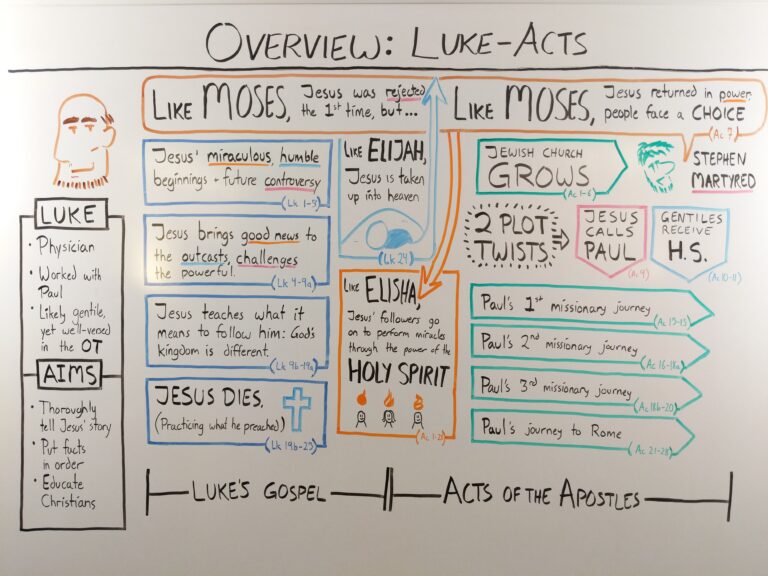The Book of Acts, moreover referred to as the Acts of the Apostles, is a important textual content inside the New Testament that offers an intensive account of the early Christian church’s development after the resurrection of Jesus Christ. The authorship of Acts has traditionally been attributed to Luke, the medical doctor, and associate of the Apostle Paul. However, one of the most intriguing additives of the have a look at of Acts is knowing its supply fabric or “hypotext.” In literary terms, a hypotext is a pre-present textual content that impacts the advent of a today’s work. This raises the question: what is luke’s hypotext for the composition of acts?
Luke’s Background and Intent
Before diving into what might probable represent Luke’s hypotext, it’s miles essential to recall Luke’s history and rationale in writing each the Gospel of Luke and the Book of Acts. Luke turned into a well-knowledgeable Gentile, probably acquainted with Jewish traditions and the Septuagint, the Greek translation of the Hebrew Bible. His reason changed into to provide an orderly account of the lifestyles of Jesus and the early church, directed within the major at a Gentile target market. He sought to show the continuity among Jesus’ ministry and the art work of the apostles, specifically emphasizing the function of the Holy Spirit.
Given this background, the query arises: what is luke’s hypotext for the composition of acts? Several theories advocate that Luke may moreover have depended on numerous sources, each written and oral, to craft his narrative.
The Septuagint as a Hypotext
One of the maximum extensively often taking place theories is that Luke’s primary hypotext for Acts is the Septuagint. The Septuagint changed into the version of the Hebrew Scriptures that maximum Jews in the Greco-Roman worldwide have been acquainted with, which include Luke. Numerous parallels among Acts and the Septuagint advise that Luke emerge as deeply endorsed with the aid of manner of these scriptures.
For example, the narrative shape of Acts mirrors the story of Israel’s statistics as depicted in the Septuagint. The story of Stephen in Acts 7 is a top instance, in which Stephen recapitulates Israel’s records, drawing at once from the Septuagint. The language, themes, and motifs in Acts often echo those determined in the Septuagint, suggesting that Luke used it as a foundational hypotext for his composition.
The Gospel of Mark as a Hypotext
Another capability supply for Luke’s composition of Acts is the Gospel of Mark. Scholars have lengthy mentioned that Luke’s Gospel stocks a vast amount of fabric with Mark, and it is capacity that this relationship extends to Acts. Mark’s portrayal of Jesus’ ministry may additionally have served as a framework for Luke’s depiction of the apostles’ ministry in Acts.
This will increase the question yet again: what is luke’s hypotext for the composition of acts? The Gospel of Mark may also have provided Luke with a tale form and thematic elements that he tailored to in shape the broader scope of his -quantity paintings, which incorporates each the Gospel and Acts.
Oral Traditions and Eyewitness Accounts
In addition to written texts, oral traditions and eyewitness debts likely performed a important function in shaping Acts. Luke explicitly states in his Gospel that he carried out cautious investigations and consulted eyewitnesses. This approach may want to definitely expand to his composition of Acts. The speeches in Acts, specifically those of Peter and Paul, also can have roots in oral traditions exceeded down through the early Christian community.
These oral sources may be taken into consideration a few other layer of hypotext, informing the narrative and theological problem topics of Acts. However, because of the reality oral traditions are fluid and lots less constant than written texts, identifying them as a specific hypotext is difficult. Nonetheless, they’re an important issue in answering the query: what is Luke’s hypotext for the composition of Acts?
Jewish and Hellenistic Historiography
Another capability hypotext for Acts is the broader way of life of Jewish and Hellenistic historiography. Luke’s fashion of writing in Acts cautiously resembles that of historical historians like Thucydides and Josephus. This indicates that Luke could have been motivated by using the usage of these traditions in how he constructed his narrative.
Luke’s emphasis on speeches, his chronological framework, and his awareness on key individuals and events are all traits of ancient historiography. This connection presents further perception into what is Luke’s hypotext for the composition of Acts? It shows that Luke was no longer just writing a theological treatise however moreover a historical account, customary thru the conventions of his time.
The Influence of Pauline Letters
Paul’s letters moreover probably caused Luke’s composition of Acts. Although Acts and the Pauline Epistles now and again range in info, there are clean thematic and narrative connections a number of the two. Luke’s portrayal of Paul’s missionary journeys and his theological positions could have been fashioned through the use of Paul’s personal writings.
This attention adds each other length to the query: what is Luke’s hypotext for the composition of Acts? It shows that Luke might likely have used Paul’s letters as a supply to authenticate and growth his account, particularly in detailing Paul’s missionary paintings and theological teachings.
Conclusion
The question of what is Luke’s hypotext for the composition of Acts is complex and multifaceted. It is not going that a unmarried textual content served as Luke’s hypotext. Instead, he possibly drew from a number of belongings, consisting of the Septuagint, the Gospel of Mark, oral traditions, Jewish and Hellenistic historiography, and Pauline letters.
Each of these elements contributed to the precise narrative and theological tapestry that Luke wove in Acts. Understanding these belongings enables us recognize the depth and richness of Luke’s work, presenting a clearer picture of ways the early Christian network understood its origins and mission. By spotting the numerous impacts that fashioned Acts, we gain a greater know-how of Luke’s motive and the historical context in which he wrote. Ultimately, the query of what is Luke’s hypotext for the composition of Acts invites us to discover the intertextual connections that enhance our reading of this foundational Christian textual content.


